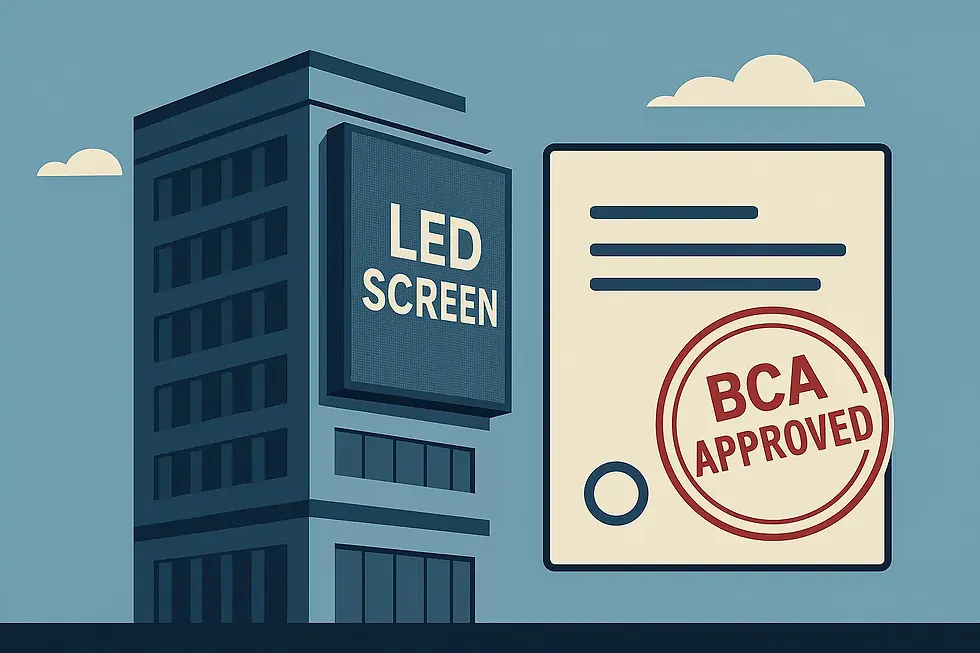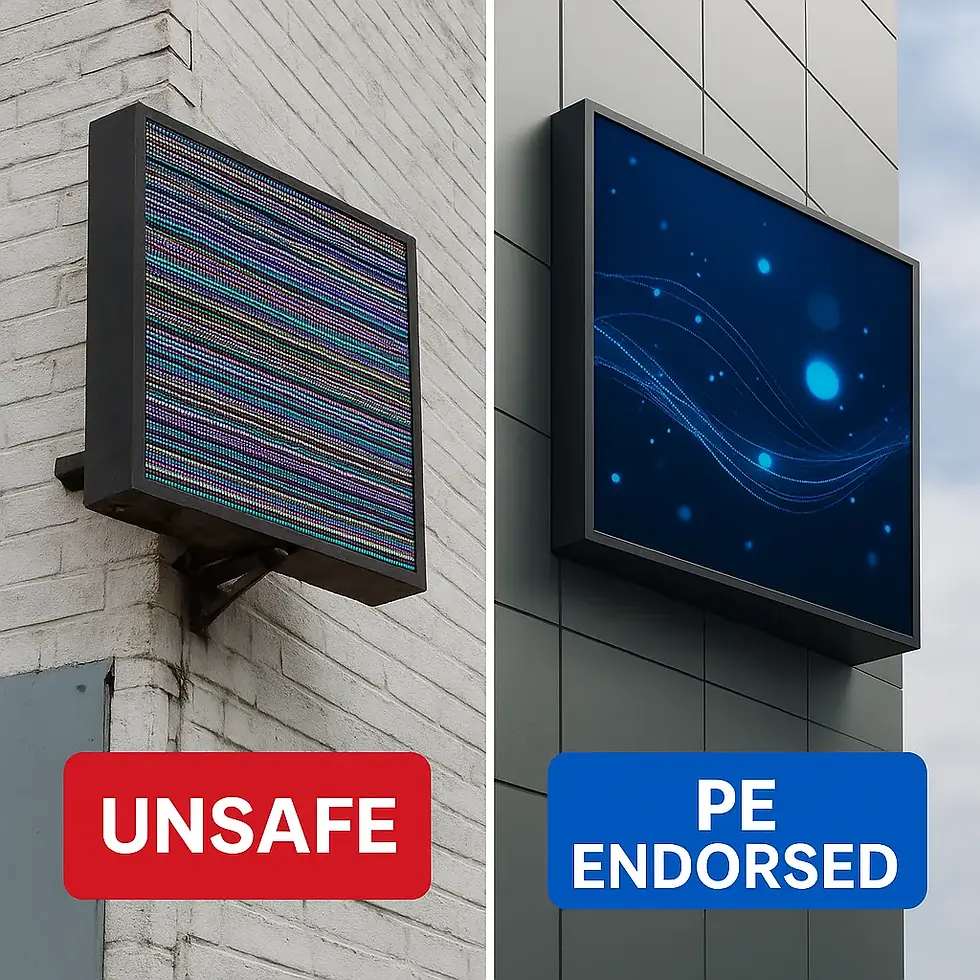Outdoor LED Screens in Singapore: Navigating BCA Approval, Compliance, and Advertising Licences
- DS Visual

- Aug 25
- 4 min read
Updated: Sep 4

Introduction
Outdoor LED screens are no longer just advertising tools — they are becoming architectural features across Singapore’s urban skyline. From Orchard Road retail façades to digital billboards along expressways, businesses are increasingly adopting outdoor LED solutions to capture public attention.
But behind the dazzling visuals lies a strict compliance framework. Unlike indoor displays, outdoor LED screens are regulated as structural elements and advertising devices, requiring approvals from the Building and Construction Authority (BCA), along with endorsements from Professional Engineers (PEs), Licensed Electrical Workers (LEWs), and sometimes even the Urban Redevelopment Authority (URA).
Failing to comply can result in stop-work orders, dismantling notices, fines, or even liability for accidents. For businesses, this makes choosing a knowledgeable partner critical — one who not only delivers cutting-edge display technology but also ensures comprehensive compliance with Singapore’s regulations.

1. BCA Approval for Structural Safety
The Building and Construction Authority (BCA) oversees the structural integrity of buildings and attachments. Outdoor LED screens, being large, heavy, and often mounted at heights, fall under this regime.
Why BCA Approval is Required
Structural Load: An LED façade can weigh several tons, and without proper anchoring, it may compromise the building’s safety.
Wind & Weather Resistance: Singapore’s monsoon seasons expose structures to high wind loads, heavy rainfall, and humidity — factors that must be accounted for in design.
Public Safety: Outdoor screens face the public domain; any failure can pose significant risks to pedestrians and vehicles.
The Approval Process
Structural Calculations – A Professional Engineer (PE) prepares detailed structural analysis covering weight, wind loading, and reinforcement requirements.
Submission to BCA – The PE endorses drawings and calculations before submitting them to BCA for approval.
Site Inspections – In some cases, BCA may require on-site verifications to confirm compliance during and after installation.
Without BCA clearance, any outdoor LED installation is considered unauthorised building works.

2. Electrical & Engineering Endorsements
Beyond structural safety, outdoor LED screens require proper electrical validation.
Professional Engineer (PE) – Certifies that the supporting structure is sound and able to withstand external stresses.
Licensed Electrical Worker (LEW) – Ensures that the electrical system is safe, grounded, and compliant with Singapore’s Electrical Safety Code. This includes load balancing, waterproofing of connections, and surge protection against lightning strikes — critical in Singapore’s tropical climate.
Failure to obtain these endorsements can result in not only regulatory breaches but also serious safety incidents such as electrical fires or equipment failure.

Aside from the structural approval, businesses cannot legally display advertisements without obtaining a BCA Outdoor Advertising Licence. This licence governs the content, placement, and operating conditions of LED advertising.
Key Considerations in the Licence Application
Location Restrictions: Only certain zones (e.g., commercial and mixed-use areas) allow outdoor advertising. Residential and heritage zones may prohibit such installations.
Screen Dimensions: Oversized LED boards that obstruct views, create glare, or distract drivers are restricted.
Brightness & Timing: BCA enforces limits on luminance levels and operational hours to protect public safety, especially along roads.
Content Restrictions: Ads must not contain offensive, obscene, or misleading information. Alcohol, gambling, and politically sensitive content are heavily regulated.
Licence Duration: Most licences are issued for a fixed period, requiring renewal to ensure ongoing compliance.
Penalties for Non-Compliance
Operating an outdoor LED screen without an advertising licence can lead to:
Hefty fines issued by BCA or URA.
Immediate removal orders for unauthorised content.
Brand reputation risks if deemed non-compliant with public regulations.

4. Why Compliance Matters
Outdoor LED screens represent significant investments — not just in terms of hardware but also installation, maintenance, and content production. Non-compliance puts this investment at risk.
Financial Risk: Dismantling an unapproved structure can cost more than the original installation.
Legal Liability: Businesses may be held accountable for accidents caused by unsafe installations.
Operational Disruption: Advertising campaigns may be halted if licences are denied or revoked.
By addressing both BCA structural approval and the advertising licence, businesses safeguard their investment and ensure long-term operational stability.

5. Conclusion
Installing an outdoor LED screen in Singapore is a complex process that extends far beyond technology. It involves engineering expertise, regulatory approval, and legal compliance.
At DS Visual, we specialise in delivering end-to-end solutions — from LED screen design and engineering analysis to handling BCA submissions and guiding clients through the advertising licence process. Our goal is simple: to ensure that your outdoor LED project is not only visually impressive but also safe, compliant, and future-ready.
👉 Planning an outdoor LED screen for your building or brand campaign?
Contact DS Visual today for a consultation backed by technical expertise and regulatory compliance.
Frequently Asked Questions (FAQ)
Q1: How long does BCA approval take for an outdoor LED screen?
Approval timelines vary depending on project complexity. On average, the structural approval process can take 4–8 weeks, including submission, review, and possible clarifications.
Q2: Do small outdoor LED screens still require BCA approval?
Yes. Even smaller outdoor LEDs (e.g., <10 sqm) may require approval if they are permanently affixed to a building or exposed to wind load. Portable event rental units may not need BCA approval but must still comply with safety regulations.
Q3: Can I start displaying content before the advertising licence is approved?
No. Advertising without a valid BCA Outdoor Advertising Licence is a violation and may result in fines or orders to stop operations.
Q4: Who applies for the BCA approvals — the client or the contractor?
Typically, the appointed contractor coordinates submissions with PEs, LEWs, and BCA. However, the building owner holds ultimate responsibility for ensuring compliance.
Q5: What are the costs involved in the approval and licensing process?
Costs vary based on screen size, location, and complexity. Beyond the LED hardware, businesses should budget for PE & LEW fees, BCA submission fees, and advertising licence costs.









Comments